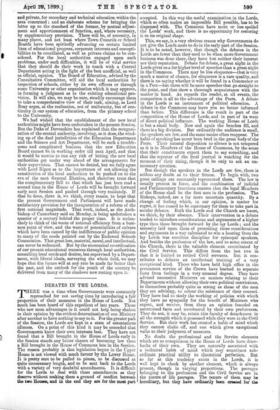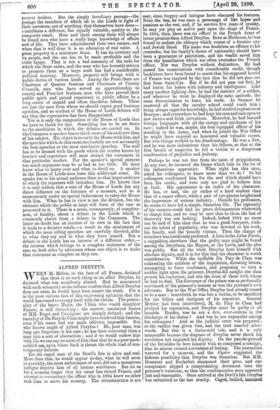DEBATES IN THE LORDS. T HERE was a time when Governments
were constantly reproached for not saving time by introducing a fair proportion of their measures in the House of Lords. Not much has been heard of this expedient of late years. Those who saw most advantages in it could not help being shaken in their opinion by the evident determination of one Ministry after another to have nothing to say to it. For the greater part of the Session, the Lords are kept in a state of ostentatious idleness. On a point of this kind it may be conceded that Governments know their own interests best. They have not found that a Bill brought in the House of Lords early in the Session stands any better chance of becoming law than a Bill brought in the House of Commons late in the Session. The reason probably is that legislation beau.. n in the Upper House is not viewed with much favour by the Lower House. It is pretty sure to be pulled to pieces, to be discussed at quite unnecessary length, and to be sent back to the Lords with a variety of very doubtful amendments. It is difficult for the Lords to deal with these amendments as they deserve without making them a ground of conflict between the two louses, and in the end they are for the moat part accepted. In this way the useful examination in the Lords, which so often makes an impossible Bill possible, has to be dispensed with. The Commons have more or leas spoiled the Lords' work, and there is no opportunity for restoring it to its original shape.
This, we say, is a very obvious reason why Governments do not give the Lords more to do in the early part of the Session. It is to be noted, however, that though the debates in the Lords are fewer than they used to be when more Government business was done there, they have lost neither their interest nor their reputation. Debate for debate, a great night in the Lords gives us a far higher level of speeches than a great night in the Commons. There may be less eloquence—that is very much a matter of chance, for eloquence is a rare quality, and there is no saying whether it will be found in a Commoner or in a Peer—but there will be more speeches that go straight to the point, and that show a thorough acquaintance with the matter in hand. As regards the reader, at all events, the comparison is all to the advantage of the Peers. A debate in the Lords is an instrument of political education. A debate in the Commons may leave you no better informed than before. This difference is the result in part of the composition of the House of Lords, and in part of its want of direct political influence. The working House of Lords is but a small body. Now and again the benches fill, and there is a big division. But ordinarily the audience is small, the speakers are few, and the same names often reappear. The habit of speaking has never been bred in the great body of the Peers. Their natural disposition to silence is not tempered as it is in Members of the House of Commons, by the sense that their constituents expect them to say something, and that the reporter of the local journal is watching for the moment of their rising, though it be only to ask an un- necessary question. But though the speakers in the Lords are few, there is seldom any doubt as to their fitness. To begin with, two great callings are constantly represented there. The law is usually present in force, and the combination of judicial and Parliamentary functions ensures that the legal Members of the House shall be the first men in the profession. The Bishops, indeed, are a far more uncertain quantity. By a change of feeling which, in our opinion, is matter for regret, it has ceased to be customary for them to take part in secular debates. Both the Lords and the Church are losers, we think, by their absence. Their intervention in a debate tended to introduce considerations and arguments of a higher type than those brought forward by the lay Lords ; and the necessity laid upon them of presenting these considerations and arguments in a way calculated to win a hearing from the lay Lords was excellent discipline for episcopal speakers. And besides the profession of the law, and to some extent of the Church, there is the valuable element contributed by the Civil Service. This differs from the last two in that it is limited to retired Civil servants. But it con- tributes to debates an intellectual training of a very exceptional kind. Those who have held high office in the permanent service of the Crown have learned to separate facts from feelings in a very unusual degree. They have advised successive Ministers on matters relating to their Departments without allowing their own political convictions, in themselves probably quite as strong as those of the men they are advising, to colour the substance of their counsel. They have had to study the working of policies with which they have no sympathy for the benefit of Ministers who expect, and receive, from them an opinion founded on ascertained facts and uncoloured by their own preferences. They do not, it may be, retain this faculty of detachment in all the strength which it possessed while they were in the Civil Service. But their work has created a habit of mind which they cannot shake off, and one which gives exceptional value to their judgment of measures.
No doubt the professional and the Service elements which are so conspicuous in the House of Lords have draw- backs of their own. They are naturally associated with a technical habit of mind which may sometimes sub- ordinate practical utility to theoretical perfection. But so far as this tendency exists in the Lords, it is well kept in check by another element, which is always present, though in varying proportions. The peerages belonging to the professions and the Civil Service are in the nature of life peerages. The tenure of them may be hereditary, but they have ordinarily been created for the present holders. But the simply hereditary peerage—the peerage the members of which sit in the Lords in right of their ancestors, not of anything they themselves have done— contributes a different, but equally valuable, quality to the composite result. Here and there among them will always be found men who have a really large knowledge of affairs and of life. They have administered their own estates, and when that is well done it is an . education of real value. A great property is a miniature State. It has its territory and its people, and the one has to be made profitable and the other happy. That is not a bad summary of the ends for which the State exists, and the man who has honestly striven to promote them on a large scale has had a considerable political training. Moreover, property still brings with it public duties of various kinds. Among the Peers there are Chairmen of Quarter Sessions and Chairmen of County Councils, men who have served an apprenticeship to county and Poor-law business, men who have proved their public spirit and gained experience in public affairs by a long career of unpaid and often thankless labour. These are just the men from whom we should expect good business speeches, and no student of the House of Lords debates will say that the expectation has been disappointed. Nor is it only the composition of the House of Lords that we have to thank for this. Something has to be set down to the conditions in which the debates are carried on. In the Commons a speaker has to think more of his audience than of his subject. His object is to carry the House with him, and the speeches which do this most successfully are not necessarily the best speeches or the most conclusive speeches. The stall has to be dressed with the goods which the vendor knows by instinct and experience will most attract the customers in that particular market. For the speaker's special purpose too much argument may be as bad as too little. He must know what to hurry over and what to dwell on. A speaker in the House of Lords soon loses this additional sense. He speaks less to his actual audience than to that larger audience to which the reporters will introduce him. He knows that it is only seldom that a vote of the House of Lords has any direct influence on the fortunes of a measure, and he is consequently under no special inducement to carry the House with him. What he has in view is not the division, but the estimate which the public at large will form of the case as presented to it. There is a sense, consequently, of complete- ness, of finality, about a debate in the Lords which is commonly absent from a debate in the Commons. The latter no doubt has an interest of its own in the fact that it leads to a decisive result,—a result to the attainment of which the most telling speeches are carefully directed, alike in what they say and in what they leave unsaid. But a debate in the Lords has an interest of a different order,— the interest which belongs to a complete statement of the case on both sides by advocates whose one object is to make that statement as complete as they can.























































 Previous page
Previous page